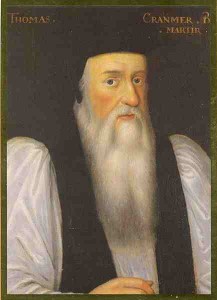 On this day in 1489, Thomas Cranmer, Archbishop of Canterbury during the reigns of Henry VIII, Edward VI and Mary I, was born in Aslockton, Nottinghamshire, England.
On this day in 1489, Thomas Cranmer, Archbishop of Canterbury during the reigns of Henry VIII, Edward VI and Mary I, was born in Aslockton, Nottinghamshire, England.
Thomas Cranmer is known for:
- His work on Henry VIII’s Great Matter, the annulment of the marriage of Henry VIII and Catherine of Aragon.
- His “Ten Articles” which were published in summer 1536 and which defined the beliefs of the new Church of England.
- Crowning Anne Boleyn
- His role in the 1549 Act of Uniformity and the Book of Common Prayer
- Being deprived of his office and being burned at the stake for heresy in 1556 by Mary I
- Being one of the Oxford Martyrs, along with Nicholas Ridley and Hugh Latimer.
You can read more about Thomas Cranmer in the following articles:
- 21 March 1556 – The Burning of Archbishop Cranmer
- The Life of Archbishop Thomas Cranmer
- Thomas Cranmer Becomes Archbishop of Canterbury
If you want to know even more about Thomas Cranmer, I’d highly recommend Thomas Cranmer: A Life by Diarmaid MacCulloch.